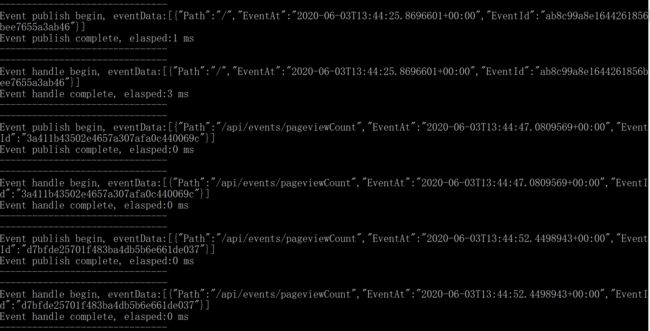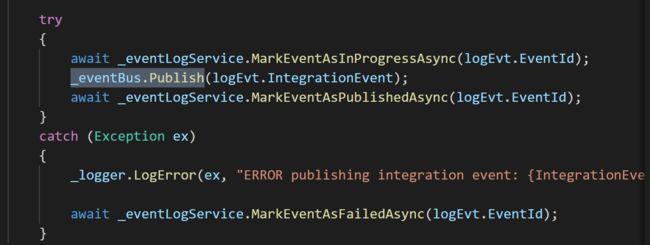结合 AOP 轻松处理事件发布处理日志
Intro
前段时间,实现了 EventBus 以及 EventQueue 基于 Event 的事件处理,但是没有做日志(EventLog)相关的部分,原本想增加两个接口, 处理事件发布日志和事件处理日志,最近用了 AOP 的思想处理了 EntityFramework 的数据变更自动审计,于是想着事件日志也用 AOP 的思想来实现,而且可能用 AOP 来处理可能会更好一些,最近自己造了一个 AOP 的轮子 —— FluentAspects,下面的示例就以它来演示了,你也可以换成自己喜欢的 AOP 组件,思想是类似的
事件日志示例
事件发布日志
事件发布日志只需要拦截事件发布的方法调用即可,在发布事件时进行拦截,在拦截器中根据需要进行日志记录即可
事件发布者接口定义:
public interface IEventPublisher
{
///
/// publish an event
///
/// event type
/// event data
/// whether the operation succeed
bool Publish(TEvent @event) where TEvent : class, IEventBase;
///
/// publish an event async
///
/// event type
/// event data
/// whether the operation succeed
Task PublishAsync(TEvent @event) where TEvent : class, IEventBase;
}
事件发布日志拦截器:
public class EventPublishLogInterceptor : AbstractInterceptor
{
public override async Task Invoke(IInvocation invocation, Func next)
{
Console.WriteLine("-------------------------------");
Console.WriteLine($"Event publish begin, eventData:{invocation.Arguments.ToJson()}");
var watch = Stopwatch.StartNew();
try
{
await next();
}
catch (Exception ex)
{
Console.WriteLine($"Event publish exception({ex})");
}
finally
{
watch.Stop();
Console.WriteLine($"Event publish complete, elasped:{watch.ElapsedMilliseconds} ms");
}
Console.WriteLine("-------------------------------");
}
}
事件处理日志
事件处理器接口定义:
public interface IEventHandler
{
Task Handle(object eventData);
}
事件处理日志拦截器定义:
public class EventHandleLogInterceptor : IInterceptor
{
public async Task Invoke(IInvocation invocation, Func next)
{
Console.WriteLine("-------------------------------");
Console.WriteLine($"Event handle begin, eventData:{invocation.Arguments.ToJson()}");
var watch = Stopwatch.StartNew();
try
{
await next();
}
catch (Exception ex)
{
Console.WriteLine($"Event handle exception({ex})");
}
finally
{
watch.Stop();
Console.WriteLine($"Event handle complete, elasped:{watch.ElapsedMilliseconds} ms");
}
Console.WriteLine("-------------------------------");
}
}
AOP 配置
Host.CreateDefaultBuilder(args)
.ConfigureWebHostDefaults(builder =>
{
builder.UseStartup();
})
.UseFluentAspectsServiceProviderFactory(options =>
{
// 拦截器配置
// 拦截 `IEventPublisher` 日志,注册事件发布日志拦截器
options
.InterceptType()
.With();
// 拦截 `IEventHandler`,注册事件处理日志拦截器
options.InterceptType()
.With();
}, builder =>
{
// 默认使用默认实现来生成代理,现在提供了 Castle 和 AspectCore 的扩展,也可以自己扩展实现自定义代理生成方式
// 取消注释使用 Castle 来生成代理
//builder.UseCastleProxy();
}, t => t.Namespace?.StartsWith("WeihanLi") == false // 要忽略的类型断言
)
.Build()
.Run();
More
事件发布示例,定义了一个发布事件的中间件:
// pageView middleware
app.Use((context, next) =>
{
var eventPublisher = context.RequestServices
.GetRequiredService();
eventPublisher.Publish(new PageViewEvent()
{
Path = context.Request.Path.Value,
});
return next();
});
事件处理示例是用一个消息队列的模式来处理的,示例和前面的事件的文章类似,EventConsumer 是一个后台任务,完整代码示例如下:
public class EventConsumer : BackgroundService
{
private readonly IEventQueue _eventQueue;
private readonly IEventHandlerFactory _eventHandlerFactory;
public EventConsumer(IEventQueue eventQueue, IEventHandlerFactory eventHandlerFactory)
{
_eventQueue = eventQueue;
_eventHandlerFactory = eventHandlerFactory;
}
protected override async Task ExecuteAsync(CancellationToken stoppingToken)
{
while (!stoppingToken.IsCancellationRequested)
{
var queues = await _eventQueue.GetQueuesAsync();
if (queues.Count > 0)
{
await queues.Select(async q =>
{
var @event = await _eventQueue.DequeueAsync(q);
if (null != @event)
{
var handlers = _eventHandlerFactory.GetHandlers(@event.GetType());
if (handlers.Count > 0)
{
await handlers
.Select(h => h.Handle(@event))
.WhenAll()
;
}
}
})
.WhenAll()
;
}
await Task.Delay(1000, stoppingToken);
}
}
}
完整的示例代码可以从https://github.com/WeihanLi/WeihanLi.Common/blob/dev/samples/AspNetCoreSample 获取
OverMore
之前在微软的 EShopOnContainers 项目里又看到类似下面这样的代码,在发布事件的时候包装一层 try ... catch 来记录事件发布日志,相比之下,本文示例中的这种方式更为简洁,代码更清爽
Reference
- https://www.cnblogs.com/weihanli/p/12941919.html
- https://www.cnblogs.com/weihanli/p/implement-event-queue.html
- https://github.com/WeihanLi/WeihanLi.Common
- https://github.com/WeihanLi/WeihanLi.Common/blob/dev/samples/AspNetCoreSample/Startup.cs

